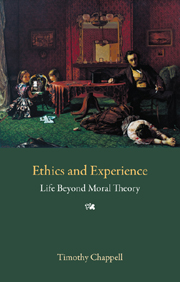Book contents
- Frontmatter
- Contents
- Acknowledgements
- 1 The turn to reason: how human beings got ethical
- 2 Demarcation: what does “ethical” mean?
- 3 Motivation: why be moral?
- 4 Deliberation: the question of reason
- 5 Introducing subjectivism and objectivism
- 6 Five arguments for ethical subjectivism
- 7 The content of ethics: expressivism, error theory, objectivism again
- 8 Virtue ethics
- 9 Utilitarianism
- 10 Kantianism and contractarianism
- 11 Theory and insight in ethics
- Further reading
- Bibliography
- Index
10 - Kantianism and contractarianism
- Frontmatter
- Contents
- Acknowledgements
- 1 The turn to reason: how human beings got ethical
- 2 Demarcation: what does “ethical” mean?
- 3 Motivation: why be moral?
- 4 Deliberation: the question of reason
- 5 Introducing subjectivism and objectivism
- 6 Five arguments for ethical subjectivism
- 7 The content of ethics: expressivism, error theory, objectivism again
- 8 Virtue ethics
- 9 Utilitarianism
- 10 Kantianism and contractarianism
- 11 Theory and insight in ethics
- Further reading
- Bibliography
- Index
Summary
In theory, there is no difference between theory and practice; but not in practice.
(Anon.)Those are my principles. If you don't like them, I have others.
(Groucho Marx)Introducing Kantianism
In the two chapters I have devoted so far to normative ethics, I have said little or nothing about rules. This might seem surprising. When philosophy students first begin thinking about normative ethics, they usually assume that it is mainly about rules, or at least basically about rules. But this certainly is not true of either virtue ethics or utilitarianism. (This is not true, at least, if it is specific rules you have in mind. You could see these theories' accounts of rightness as rules in themselves, so that virtue ethics becomes identical with some rule such as “Always do the action that the virtuous agent would characteristically do in the circumstances”, and utilitarianism becomes identical with some rule such as “Always do the action with the best consequences for happiness or pleasure”. But this is not what people usually mean by talking about rules.)
It is not that either virtue ethics or utilitarianism is necessarily hostile to rules. Both theories can involve laying down moral rules, including, quite possibly, unbreakable rules. (Or at any rate, rules that a moral agent should view as unbreakable, which is not quite the same thing.) Rules are obviously an important part of rule utilitarianism, and of some other “two-level” utilitarian theories (see §9.7).
- Type
- Chapter
- Information
- Ethics and ExperienceLife Beyond Moral Theory, pp. 153 - 183Publisher: Acumen PublishingPrint publication year: 2009

